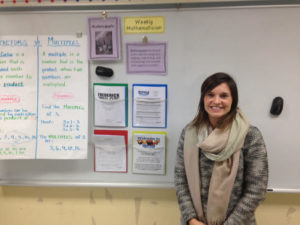
As a former volunteer academic mentor and now educator, it was clear to Melissa Hamilton that Boston Partners benefits students in ways beyond academics: “Seeing an adult take time out of their life or their job, or their own schooling, to come and focus on you and the questions you have, and the struggles you’re experiencing – it shows students the importance of education.”
Teachers have often used Boston Partners in Education to either transition into teaching or to decide if teaching is something that they truly want to do. Then, academic mentors who go on to become teachers will recruit their own Boston Partners mentors for their classroom, knowing the positive impacts one-on-one mentorship can have on a student.
Before becoming an academic mentor, Melissa Hamilton was determined to become a teacher in the Boston Public Schools. “I always wanted to teach middle school math, because middle school was a time in my life where I started making the decisions about what I liked and didn’t like,” she explains.
In sixth grade, Melissa did not like math. The next two years of middle school, her math teacher completely changed this perspective. “By eighth grade, I was taking an extra elective where we made math gadgets and played math games, and made those different connections between real life and math,” she says. “I know this is such a deciding point in our student’s lives in terms of academics, and in their personal lives, so that’s why I want to teach these grade levels.”
Melissa’s math classroom is in the brightly lit and modern walls of the Frederick Pilot Middle School. In contrast to the pristine and structured environment of the school, however, are the realities of many of her student’s lives.
“We’re in a neighborhood that has very high poverty,” Melissa shares. The majority of the student body is on 100% free and reduced lunch plan. “Grove Hall, where we are, has the highest percentage of crime for the city of Boston. I’ve attended a few too many funerals than planned,” she adds. A number of students have lost siblings to violence in the neighborhood.
For other students, they are forced to become responsible at a young age—taking care of themselves and younger siblings since parents are often working nights or weekends.
“Really, about 75% of this job is setting up our students for success in life, and how to respond when they’re faced with different adversities. The other 25% is the math, is the unit rates, and the dividing fractions,” explains Melissa.
A large aspect Melissa’s job is to teach these kids how to advocate for themselves as students and as young people. As a result, the school depends on support from many sources (including Boston Partners) to provide extra-curricular activities and support for their students who are at risk of falling behind.
Melissa’s first experience as an educator at the Frederick Pilot School was as a Boston Partners academic mentor. After seeing a principal give a speech on the benefits of mentoring programs, she spoke to him personally, and he recommended she contact our organization.
Her first year, she worked with two brothers and another student. Melissa would retrieve them from class and walk to the library for reading and writing. The students were shy and reserved, and also spoke English as a second language. “You could tell they were becoming more comfortable with those social parts of the language,” she reflects. “I was available to help with primarily with the academic language.”
Melissa felt that she had more freedom as a mentor to know the students on a personal level. “I was definitely able to kind of pull a little more personality out of them,” she says. “But, still say we have to get this work done.” One day, when the students were starting to understand multiplication, they became so excited that she had to remind them they were still in the school library.
Her students quickly became excited for their mentoring sessions. “[Their teacher] Miss Leone would share with me that they were waiting or asking what time it was, because they knew I should be there that day,” Melissa recalls. “They were excited for the special attention.” The students enjoyed the special one-on-one attention they were receiving, and often wrote her thank you cards.
Melissa experienced firsthand how Boston Partners’ academic mentors fit into the mission of her seventh grade classroom at Frederick Pilot School. She hosted an academic mentor who came to her class once a week to work with a few young boys on their confidence and problem solving skills in math.
The students would be waiting and constantly ask if or when their mentor would be there—then they would leave and work with their mentor away from class. “It very much mirrored the experience I had. It was a really special opportunity for them,” says Melissa fondly.
As a former volunteer academic mentor and now educator, it was clear to Melissa Hamilton that Boston Partners benefits students in ways beyond academics: “Seeing an adult take time out of their life or their job, or their own schooling, to come and focus on you and the questions you have, and the struggles you’re experiencing – it shows students the importance of education.”
